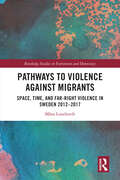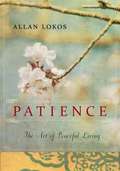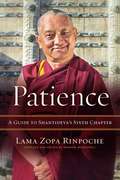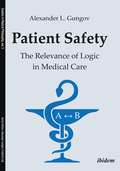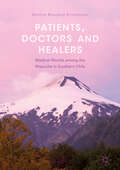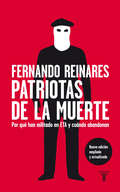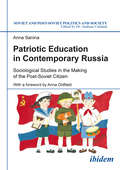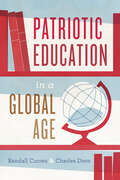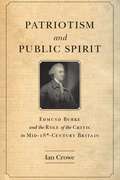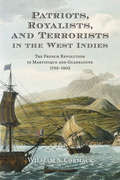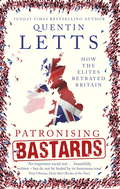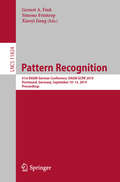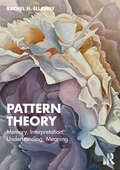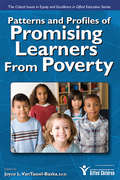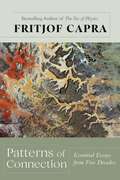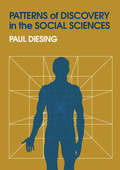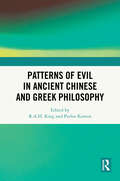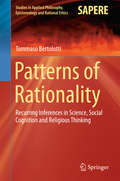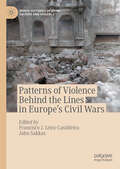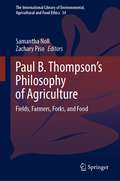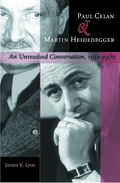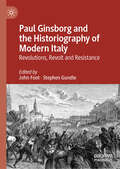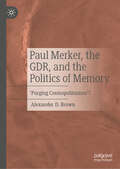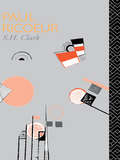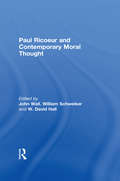- Table View
- List View
Pathways to Violence Against Migrants: Space, Time and Far Right Violence in Sweden 2012–2017 (Routledge Studies in Extremism and Democracy)
by Måns LundstedtPathways to Violence Against Migrants traces the different pathways, or combinations of causal mechanisms, that lead from non-violent opposition to migration into anti-migrant violence. Applying the conceptual apparatus of social movement studies (frames, relations, opportunities and collective emotions), the book develops six distinct sequences of causal mechanisms. These show how violence can develop through rapid processes of moral outrage and far right mobilisation, through long processes of uneven demobilisation and escalation, or independently of any nonviolent protest at all. The six pathways are developed through a comparative, mixed-methods study of 81 cases of anti-migrant violence in Sweden between 2012 and 2017. The cases involve various actors (ranging from unorganised youth gangs and village associations to neo-Nazi organisations) as well as very different types and intensities of violence (from death threats to arson attacks and bombings). Demonstrating the diversity of pathways to violence in a restricted setting and against a restricted category of targets, the book argues strongly against reducing the causes of violence to individual pathology, to ideological ”extremism”, or to any single explanatory model. This book will be of interest to researchers of political violence, the far right, anti-migrant politics, racism, and social movements.
Patience
by Allan Lokos"As founder and guiding teacher of the Community Meditation Center in New York, Allan Lokos has an arsenal of tools for coping with stressful situations. " - Rachel Lee Harris, New York Times To survive the roller-coaster ride of life, with its ever-changing shifts from pleasure to pain, gain to loss, and praise to blame, requires a substantial depth of patience. In this life-changing book, Allan Lokos sheds new light on this much-sought-after state of mind, and provides a road map for cultivating greater patience in one's life. According to Lokos, to develop a depth of patience we must first acknowledge the unhappiness caused by our impatience and anger in its many manifestations-from mild annoyance to rage. In this revelatory book, Lokos draws on his many years as a Buddhist practitioner and spiritual teacher, as well as interviews with a wide range of individuals who have had their patience tested-often dramatically so-and lays out a compelling path to the heart of patience. " .
Patience
by Lama Zopa RinpocheLama Zopa Rinpoche, one of the great living masters of Tibetan Buddhism, guides us through one of the core practices of the bodhisattvas, using a classic, revered text as a guide.&“Shantideva was like us, but he worked on his mind until he became completely free from delusions . . . A Guide to the Bodhisattva&’s Way of Life has inspired countless people since it was written over thirteen hundred years ago. It tells us that we too can develop our mind to the levels of realizations that the great masters have attained—and it shows us how to do it.&” —Lama Zopa Rinpoche The sixth chapter of Shantideva&’s classic A Guide to the Bodhisattva&’s Way of Life is a beacon of inspiration that shows what patience—one of the essential actions of the bodhisattvas—can really mean, challenging the reader to great depths of self-reflection and to great heights of awakened action in the world. Lama Zopa Rinpoche—a teacher whose very name means &“patience&”—explores Shantideva&’s teachings verse by verse, unpacking its lessons for the modern reader: - Overcoming anger - Accepting suffering - Respecting others and finding happiness in their happiness In this guide, Rinpoche shows us the profundity and relevance of this incredible bodhisattva&’s practice for us ordinary beings in our ordinary lives.
Patient Safety: The Relevance of Logic in Medical Care (Studies In Medical Philosophy Ser. #5)
by Alexander L. GungovIn our time of well-publicized health care travails, in the U.S. and the UK and elsewhere, matters of financing too often subsume the dimension of patient care. In his latest book, Alexander L. Gungov studies a vital but neglected aspect of patient safety. Of the thousands of medical errors committed on a daily basis, in the bulk of unfortunate clinical decisions, a significant share pertains to various logical flows and epistemological fallacies. By focusing on the logical dimensions of clinical medicine, Gungov promotes awareness of the logical and epistemological traps that lie in the day-to-day care of patients. Such a focus not only allows us to avoid falling into them, but demonstrates the practical value of looking at medicine from a new philosophical perspective. That perspective involves a broad and unusual collection of philosophers. The discussion takes its starting point from J. S. Mill’s inductive methods and Giambattista Vico’s verum-factum principle, but then sets out a unique combination of Charles Sanders Peirce’s abductive reasoning, Immanuel Kant’s reflective judgment, as well as G. W. F. Hegel’s and D. P. Verene’s speculative thinking, all marshalled to present a novel philosophical account of clinical diagnostics. Interpretation of practical examples elucidate the logical aspect of medical errors and suggests strategies of overcoming them. The book as a whole demonstrates the value of Hans-Georg Gadamer’s hermeneutical insights into the enigmatic character of health. This much-needed book will be of interest to medical practitioners, health policy makers, patients and their families, and advanced students and scholars in medicine, the medical humanities, medical epistemology, and the philosophy of medicine in general.
Patients, Doctors and Healers
by Dorthe Brogård KristensenRecognizing the interplay between biomedicine and indigenous medicine among the Mapuche in Southern Chile, this book explores notions of culture and personhood through the bodily experiences and medical choices of patients. Through case studies of patients in the context of medical pluralism, Kristensen argues that medical practices are powerful social symbol indicative of overarching socio-political processes. As certain types of extreme and violent experiences–known as olvidos–lack a framework that allows them to be expressed openly, they therefore surface as symptoms of an illness, often with no apparent organic pathology. In these contexts, indigenous medicine, thanks to its sensitivity to socio-political contexts, provides a space for articulation and management of collective experiences and suffering among patients in Southern Chile.
Patriotas de la muerte: Por qué han militado en ETA y cuándo abandonan (Pensamiento Ser.)
by Fernando Reinares¿Qué motivaciones tienen los militantes de ETA? ¿Cuáles son sus características sociales y cómo han evolucionado dichos rasgos a lo largo del tiempo? ¿Dónde adquirieron esos individuos las actitudes y creencias propias de un nacionalismo vasco étnico y excluyente, que les llevó a justificar la violencia política y a implicarse en actividades terroristas? ¿A qué obedece que gran parte de los pistoleros etarras haya terminado por dejar consciente y voluntariamente la organización terrorista? ¿Quiere esto decir que salen de ella arrepentidos de hacer lo que hicieron? Fernando Reinares, uno de los mayores especialistas internacionales en terrorismo, responde a estos interrogantes a la vez como académico y como ciudadano. Para ello ha utilizado, por una parte, información sobre casi setecientos cincuenta militantes de ETA extraída de documentos judiciales y, por otra, testimonios obtenidos a través de entrevistas en profundidad con cincuenta y uno de ellos. Tan excepcionales testimonios y el soberbio análisis de los mismos son fundamentales para entender por qué, durante más de cuarenta años, centenares de jóvenes y adolescentes vascos decidieron ingresar en ETA, al igual que sus verdaderos motivos para dejar atrás la militancia terrorista. «Basado en un amplio material empírico, Fernando Reinares ha escrito una obra imprescindible para el conocimiento de la organización terrorista.» JAVIER PRADERA, El País «Estremecedor y extraordinario.» ALFONSO USSÍA, ABC «Si leyeran este libro quienes tienen a los etarras como individuos a imitar, se les caería súbitamente la venda de los ojos.» JUSTINO SINOVA, El Mundo
Patriotic Education in Contemporary Russia: Sociological Studies in the Making of the Post-Soviet Citizen (Soviet and Post-Soviet Politics and Society #168)
by Anna SaninaThis book outlines the complexities, contestation, and contradictions in the formal organization and contents of patriotic education in post-Soviet Russia. While the topics of patriotism and patriotic education are highly political and politicized, this study approaches them from a more sociological perspective. It is based on a variety of sources and empirical data, including the indicators and budgets of federal and regional patriotic-education programs and on field research. The book explores in depth all major agents of patriotic education in Russia, such as the government, schools, youth associations, churches, and the film/cartoon industry. It traces the development of governmental patriotic programs in recent decades, discusses how the Soviet past and political traditions influence today's system of patriotic education, and presents numerous case studies illustrating real-life processes in current patriotic education.
Patriotic Education in a Global Age (History and Philosophy of Education Series)
by Randall Curren Charles DornShould schools attempt to cultivate patriotism? If so, why? And what conception of patriotism should drive those efforts? Is patriotism essential to preserving national unity, sustaining vigorous commitment to just institutions, or motivating national service? Are the hazards of patriotism so great as to overshadow its potential benefits? Is there a genuinely virtuous form of patriotism that societies and schools should strive to cultivate? In Patriotic Education in a Global Age, philosopher Randall Curren and historian Charles Dorn address these questions as they seek to understand what role patriotism might legitimately play in schools as an aspect of civic education. They trace the aims and rationales that have guided the inculcation of patriotism in American schools over the years, the methods by which schools have sought to cultivate patriotism, and the conceptions of patriotism at work in those aims, rationales, and methods. They then examine what those conceptions mean for justice, education, and human flourishing. Though the history of attempts to cultivate patriotism in schools offers both positive and cautionary lessons, Curren and Dorn ultimately argue that a civic education organized around three components of civic virtue—intelligence, friendship, and competence—and an inclusive and enabling school community can contribute to the development of a virtuous form of patriotism that is compatible with equal citizenship, reasoned dissent, global justice, and devotion to the health of democratic institutions and the natural environment. Patriotic Education in a Global Age mounts a spirited defense of democratic institutions as it situates an understanding of patriotism in the context of nationalist, populist, and authoritarian movements in the United States and Europe, and will be of interest to anyone concerned about polarization in public life and the future of democracy.
Patriotism and Public Spirit: Edmund Burke and the Role of the Critic in Mid-Eighteenth-Century Britain
by Ian CrowePatriotism and Public Spiritis an innovative study of the formative influences shaping the early writings of the Irish-English statesman Edmund Burke and an early case-study of the relationship between the business of bookselling and the politics of criticism and persuasion. Through a radical reassessment of the impact of Burke's "Irishness" and of his relationship with the London-based publisher Robert Dodsley, the book argues that Burke saw Patriotism as the best way to combine public spirit with the reinforcement of civil order and to combat the use of coded partisan thinking to achieve the dominance of one section of the population over another. No other study has drawn so extensively on the literary and commercial network through which Burke's first writings were published to help explain them. By linking contemporary reinterpretations of the work of Patriot sympathizers and writers such as Alexander Pope and Lord Bolingbroke with generally neglected trends in religious and literary criticism in the Republic of Letters, this book provides new ways of understanding Burke's early publications. The results call into question fundamental assumptions about the course of "Enlightenment" thought and challenge currently dominant post-colonialist and Irish nationalist interpretations of the early Burke.
Patriots, Royalists, and Terrorists in the West Indies: The French Revolution in Martinique and Guadeloupe, 1789-1802
by William CormackPatriots, Royalists, and Terrorists in the West Indies examines the complex revolutionary struggle in Martinique and Guadeloupe from 1789 to 1802. The arrival of tricolour cockades – a badge symbol of the French Revolution – and news from Paris in 1789 undermined the royal governors’ authority, unleashed bitter conflict between white factions, and encouraged the aspirations of free people of colour to equality and black slaves to freedom. This book provides a detailed narrative of the shifting political developments, and analyses the roles of planter resentment of metropolitan control, social and racial tensions, and the ambiguity of revolutionary principles in a colonial setting. Recent scholarship has tended to over-emphasize the colonies’ agency, and to accentuate the conflict between masters and slaves, while downplaying metropolitan influences. In contrast, this study seeks to restore the importance of destabilizing political struggles between white factions. It argues that metropolitan news, ideas, language, and political culture: the "revolutionary script" from France; played a key role in shaping the revolution in the colonies.
Patronising Bastards: How the Elites Betrayed Britain
by Quentin LettsFrom the Sunday Times bestselling author of 50 People Who Buggered Up Britain, Quentin Letts, comes his blistering new book on how Britain's out-of-touch, illiberal elite fills its boots.'HILARIOUS' Daily Mail'With its vicious takedowns, Quentin Letts' laugh-out-loud Patronising Bastards will have the lefty-elite running scared' The SunNot since Marie Antoinette said 'Let them eat cake' have the peasants been so revolting. Western capitalism's elites are bemused: Brexit, Trump, and maybe more eruptions to follow. But their rulers were so good to them! Hillary Clinton called the ingrates 'a basket of deplorables', Bob Geldof flicked them a V sign, Tony Blair thought voters too thick to understand the question. Wigged judges stared down their legalistic noses at a surging, pongy populous.These people who know best, these snooterati with their faux-liberal ways, are the 'Patronising Bastards'. Their downfall is largely of their own making - their Sybaritic excesses, an obsession with political correctness, the prolonged rape of reason and rite. You'll find these self-indulgent show-ponys not just in politics and the cloistered old institutions but also in high fashion, football, among the clean-eating foodies and at the Baftas and Oscars, where celebritydom hires PR smoothies to massage reputations and mislead, distort, twist. Political columnist and bestselling author Quentin Letts identifies these condescending creeps and their networks, their methods and their dubious morals. Letts kebabs them like mutton. It's baaaahd. It's juicy.Richard Branson, Emma Thompson, Shami Chakrabarti, Jean-Claude Juncker and any head waiter who calls you 'young man' - this one's for you!
Pattern Recognition: 41st DAGM German Conference, DAGM GCPR 2019, Dortmund, Germany, September 10–13, 2019, Proceedings (Lecture Notes in Computer Science #11824)
by Gernot A. Fink Xiaoyi Jiang Simone FrintropThis book constitutes the proceedings of the 41st DAGM German Conference on Pattern Recognition, DAGM GCPR 2019, held in Dortmund, Germany, in September 2019. The 43 revised full papers presented were carefully reviewed and selected from 91 submissions. The German Conference on Pattern Recognition is the annual symposium of the German Association for Pattern Recognition (DAGM). It is the national venue for recent advances in image processing, pattern recognition, and computer vision and it follows the long tradition of the DAGM conference series.
Pattern Theory: Memory, Interpretation, Understanding, Meaning
by Rachel H. EllawayPattern Theory is a groundbreaking exploration of the concept of pattern across a range of disciplines, including science, neuroscience, psychology, and social sciences.This book examines the meaning and implications of pattern, presenting a comprehensive body of theory that unifies concepts of form, order, and regularity and connects them to memory and perception. By challenging existing orthodoxies and linking evidence from brain and mind function, it outlines a robust theoretical framework around pattern searching and matching, pattern activation, and the continuity of pattern nexuses. This in-depth study of pattern theory and pattern thinking delves into the cognitive basis of patterns, their impact on reasoning and learning, and the social and collaborative nature of pattern recognition, expression, and representation. It also addresses philosophical issues and implications surrounding shared pattern thinking and introduces a broad conceptual basis for "pattern inquiry", providing a range of questions and methodologies for applying pattern theory. The book culminates in a manifesto for pattern theory and its application in pattern inquiry, offering 50 key principles that can be applied across various settings. Researchers, scholars, and practitioners are encouraged to explore and critique this unified theory as a lens for examining social and cognitive phenomena.Ideal for academics and professionals seeking to challenge their understanding of the connections between mind and society, as well as for those looking to deepen their understanding of pattern as a cognitive phenomenon, as a theoretical lens, and as a meta-methodology for inquiry, this text provides a substantive foundation for ongoing development and application of pattern science across multiple fields.
Patterns and Profiles of Promising Learners from Poverty
by Joyce Vantassel-BaskaPatterns and Profiles of Promising Learners From Poverty provides a comprehensive review of the issues surrounding the education and inclusion of promising students from poverty in gifted and talented programs.
Patterns of Connection: Essential Essays from Five Decades
by Fritjof CapraWinner of the Silver Medal for Environment/Ecology in the 2022 Independent Publisher (IPPY) Book AwardsFritjof Capra, scientist, educator, activist, and accomplished author, presents the evolution of his thought over five decades in Patterns of Connection. First introduced in the late 1950s to the work of Werner Heisenberg, a founder of quantum mechanics, Capra quickly intuited the connections between the discoveries of quantum physics and the traditions of Eastern philosophy—resulting in his first book, the bestselling The Tao of Physics. This synthesis, representative of the change from the mechanistic worldview of Descartes and Newton to a systemic, ecological one, went on to inform Capra&’s thinking about the life sciences, ecology, and environmental policy. His observations of sustainable communities in nature inspired his work on systems theory—the complex web of interrelated processes that organize everything from biological systems to social, cultural, and political systems.Today Fritjof Capra remains a major figure at the crossroads of physics, spirituality, environmentalism, and systems theory. Organized thematically and chronologically, the essays in Patterns of Connection document the revolutionary and far-reaching intellectual journey of one of the major public thinkers of the last half-century.
Patterns of Discovery in the Social Sciences
by Paul DiesingSocial scientists are often vexed because their work does not satisfy the criteria of "scientific" methodology developed by philosophers of science and logicians who use the natural sciences as their model. In this study, Paul Diesing defines science not by reference to these arbitrary norms delineated by those outside the field but in terms of norms implicit in what social scientists actually do in their everyday work.
Patterns of Evil in Ancient Chinese and Greek Philosophy
by Pavlos Kontos R.A.H. KingThe roots of evil are often held to be Biblical, but philosophers in ancient China and Greece were thoroughly conversant with both the phenomena and the languages of evil. This volume provides a comparative examination of patterns of evil in ancient Chinese and Greek philosophy.With no genealogical connections to rely on, the comparativist must establish a framework to connect these traditions. This volume utilizes the notion of "patterns" to address worries of methodological and ethical incommensurability, and to show what this means for the practice of comparative philosophy. In the case of evil, this methodology requires diving deep into the linguistic and political murk where evil lurks, with its deep roots in human dispositions for experience and action. The nine chapters are arranged in two parts. Those of Part I are written by scholars with a strong background in comparative philosophy and offer a substantial analysis of how both traditions respond to a specific aspect of the phenomenology of evil. Those of Part II are “twinned” chapters, that is, chapters that discuss similar topics in close dialogue with one another, but each does it from within either of these traditions. The volume is concluded with a reflection on the varieties of comparative strategies employed in the nine chapters.Patterns of Evil in Ancient Chinese and Greek Philosophy will appeal to scholars and graduate students interested in comparative philosophy, ancient Greek philosophy, early Chinese philosophy, and the problem of evil quite generally.
Patterns of Rationality
by Tommaso BertolottiThis book proposes an applied epistemological framework for investigating science, social cognition and religious thinking based on inferential patterns that recur in the different domains. It presents human rationality as a tool that allows us to make sense of our (physical or social) surroundings. It shows that the resulting cognitive activity produces a broad spectrum of outputs, such as scientific models and experimentation, gossip and social networks, but also ancient and contemporary deities. The book consists of three parts, the first of which addresses scientific modeling and experimentation, and their application to the analysis of scientific rationality. Thus, this part continues the tradition of eco-cognitive epistemology and abduction studies. The second part deals with the relationship between social cognition and cognitive niche construction, i. e. the evolutionarily relevant externalization of knowledge onto the environment, while the third part focuses on what is commonly defined as "irrational", thus being in a way dialectically opposed to the first part. Here, the author demonstrates that the "irrational" can be analyzed by applying the same epistemological approach used to study scientific rationality and social cognition; also in this case, we see the emergence of patterns of rationality that regulate the relationships between agents and their environment. All in all, the book offers a coherent and unitary account of human rationality, providing a basis for new conceptual connections and theoretical speculations.
Patterns of Violence Behind the Lines in Europe’s Civil Wars (World Histories of Crime, Culture and Violence)
by Francisco J. Leira-Castiñeira John SakkasThis edited collection examines the violence experienced by non-combatants during the civil wars which took place in Europe in the first half of the twentieth century. The determinants of violence in civil wars are highly complex and variable. By focusing on both the victims and perpetrators of violence in eight European countries, including Russia, Ireland, France and Spain, the book explores what happened when differing groups within a polity clashed, and in which ways internal conflicts manifested themselves and permeated societies. Divided into two parts, the chapters firstly identify and analyse how rearguard violence was produced and exercised during the European civil wars, and secondly, they examine the violence perpetrated by, and against, women. Shedding light on the violence that was inflicted upon European civilians in the early- to mid-twentieth century, this book presents insights for historians of Europe, political scientists, and international relations scholars alike.
Paul B. Thompson's Philosophy of Agriculture: Fields, Farmers, Forks, and Food (The International Library of Environmental, Agricultural and Food Ethics #34)
by Zachary Piso Samantha NollThis book explores the philosophical thought and praxis of Paul B. Thompson, who planted some of the first seeds of philosophy of agriculture and whose work inspires interdisciplinary scholarship in food ethics, biotechnology, and environmental philosophy. Landmark texts such as The Spirit of the Soil, The Agrarian Vision, and From Field to Fork revealed the fertility of food systems for inspiring reflection on our relationships to technology, the land, and one another. Rooted in philosophical traditions ranging from pragmatism to post-phenomenology, Thompson’s work nourishes projects in ethics, epistemology, philosophy of science, and social and political theory, not only in academic philosophy departments but also in the social and natural sciences. This volume collects this diversity of thought in a tour of the many fields of food systems; from theorizing the sustainability of agroecological systems, to appreciating the quotidian practice of agrarian communities, to anticipating the impacts of emerging biotechnology, and to savoring the roles that food plays in forming our identities. Composed by an international crop of scholars working on the future of food ethics, the volume is a vital contribution to scholars and practitioners thinking through our relationships to the food systems that sustain us.
Paul Celan and Martin Heidegger: An Unresolved Conversation, 1951–1970
by James K. LyonThis work explores the troubled relationship and unfinished intellectual dialogue between Paul Celan, regarded by many as the most important European poet after 1945, and Martin Heidegger, perhaps the most influential figure in twentieth-century philosophy. It centers on the persistent ambivalence Celan, a Holocaust survivor, felt toward a thinker who respected him and at times promoted his poetry. Celan, although strongly affected by Heidegger's writings, struggled to reconcile his admiration of Heidegger's ideas on literature with his revulsion at the thinker's Nazi past. That Celan and Heidegger communicated with each other over a number of years, and in a controversial encounter, met in 1967, is well known. The full duration, extent, and nature of their exchanges and their impact on Celan's poetics has been less understood, however. In the first systematic analysis of their relationship between 1951 and 1970, James K. Lyon describes how the poet and the philosopher read and responded to each other's work throughout the period. He offers new information about their interactions before, during, and after their famous 1967 meeting at Todtnauberg. He suggests that Celan, who changed his account of that meeting, may have contributed to misreadings of his poem "Todtnauberg." Finally, Lyon discusses their two last meetings after 1967 before the poet's death three years later. Drawing heavily on documentary material—including Celan's reading notes on more than two dozen works by Heidegger, the philosopher's written response to the poet's "Meridian" speech, and references to Heidegger in Celan's letters—Lyon presents a focused perspective on this critical aspect of the poet's intellectual development and provides important insights into his relationship with Heidegger, transforming previous conceptions of it.
Paul Ginsborg and the Historiography of Modern Italy: Revolutions, Revolt and Resistance
by John Foot Stephen GundleThis book brings together a group of British and Italian scholars who have made significant contributions to the historiography of modern Italy over the last three decades, dedicated to the influence of Paul Ginsborg. Reflecting Ginsborg's interest in the encounter of social and political history in modern Italy, contributions explore the varied forms taken by activism in civil society. Rather than just treating activism and engagement as limited, circumscribed phenomena within a political system, the essays consider these as interventions in the social. Taken together, the contributions gathered here highlight Ginsborg's contributions to scholarship and activism, as well as advancing our understanding of cultural change, institutional reform and the renewal of community in modern Italian history.
Paul Merker, the GDR, and the Politics of Memory: ‘Purging Cosmopolitanism’?
by Alexander D. BrownThis book presents ground-breaking research into the ‘Merker affair,’ a series of events that took place in the German Democratic Republic (GDR) in the early 1950s, which saw Paul Merker, a member of the ruling party’s ‘Politburo,’ become ensnared in the agent hysteria of the period. He was ultimately deposed, arrested, and convicted on charges of espionage. However, the cultural significance of this affair goes far beyond the history of the early Cold War; it has become the definitive symbol of alleged antisemitism in the GDR. The narrative complex of an antisemitic GDR has in turn become a prominent topos within the politics of memory in Germany. The author combines an empirical study of the pertinent primary sources with a genealogical analysis of discourse on the Merker affair in order to question and historicise many of the entrenched historiographical tropes surrounding it, and indeed broader subjects such as antifascism and antisemitism in a German context. In doing so, the book offers insight into how German state-mandated institutions and official bodies have shaped our collective vision of the past.
Paul Ricoeur (Critics of the Twentieth Century)
by Steven H. Clark"First Published in 1990, Routledge is an imprint of Taylor & Francis, an informa company."
Paul Ricoeur and Contemporary Moral Thought
by John Wall; William Schweiker; W. David HallThis book explores and proposes new avenues for contemporary moral thought. It defines and assesses the significance of the writings of French philosopher Paul Ricoeur for ethics. The book also explores what matters most to persons and how best to sustain just communities.
